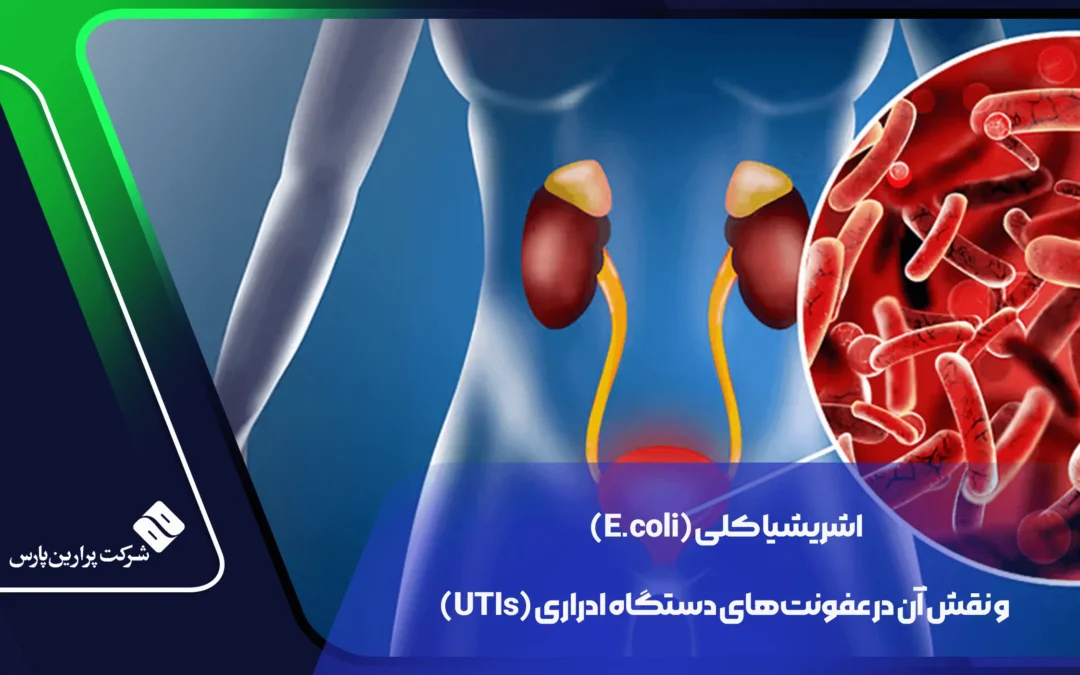Escherichia coli (E. coli) is a type of bacteria that naturally resides in the intestines of humans and animals. In most cases, it is harmless and even plays a crucial role in the digestive process. However, some strains of E. coli can be pathogenic and cause serious infections. One of the most common infections caused by this bacterium is urinary tract infections (UTIs). This disease is particularly more common in women and, if left untreated, can lead to more serious problems such as kidney infections.
How E. coli Causes Urinary Tract Infections
Approximately 80-90% of urinary tract infections are caused by E. coli. This bacterium is usually transferred from the intestines to the urinary tract, then enters the bladder and, in some cases, the kidneys. One of the main reasons for the higher prevalence of this infection in women is that their urethra is shorter than men’s, making it easier for E. coli to enter the bladder. Several factors can increase the risk of urinary tract infections caused by E. coli, including:
- Poor personal hygiene, which can allow E. coli to transfer from the intestines to the urinary tract.
- Wearing tight, non-breathable clothing, which may facilitate the growth of E. coli.
- Holding urine for long periods, which increases the chance for E. coli to multiply in the bladder.
- Using urinary catheters, which create a favorable environment for E. coli to grow.
- Weak immune systems, which make the body more susceptible to infections caused by E. coli.
Symptoms of Urinary Tract Infections Caused by E. coli
Urinary tract infections (UTIs) may present with various symptoms, and their severity depends on how widespread the infection is in the body. Some of the most common symptoms include:
- A burning sensation when urinating
- Frequent urination with small amounts of urine
- Cloudy or foul-smelling urine
- Pain in the lower abdomen or pelvis
- Blood in the urine (hematuria), which can result from damage to the bladder wall by E. coli
- General fatigue and weakness due to the immune response to E. coli
- Fever and chills in severe cases, which may indicate the spread of E. coli to the kidneys
Diagnosis and Treatment
The diagnosis of a urinary tract infection (UTI) is typically made through a urine test. This test checks for the presence of white blood cells and E. coli bacteria in the urine. In some cases, a urine culture is performed to identify the specific strain of E. coli and determine its sensitivity to antibiotics.
Treatment options include:
- Antibiotics: The most common treatment for UTIs is the use of antibiotics such as nitrofurantoin, ciprofloxacin, and trimethoprim-sulfamethoxazole. The type of antibiotic is determined based on the test results and the sensitivity of the E. coli strain.
- Increased fluid intake: Drinking plenty of water helps flush the bacteria out of the urinary system.
- Pain relievers: To reduce pain and discomfort, some patients may use painkillers such as acetaminophen.
- Cranberry supplements: Some studies have shown that cranberry can prevent E. coli from attaching to the bladder walls. Cranberries contain compounds called proanthocyanidins that can help prevent E. coli from adhering to bladder cells.
- Probiotics: Consuming probiotic-rich foods like yogurt can help balance beneficial bacteria against E. coli and prevent its overgrowth.
Prevention of Urinary Tract Infections
To prevent urinary tract infections, the following measures are recommended:
- Maintain personal hygiene and wash hands before and after using the restroom to prevent E. coli transmission.
- Urinate after sexual intercourse to reduce the risk of E. coli entering the urinary tract.
- Drink sufficient water to maintain kidney and bladder health and aid in the elimination of E. coli.
- Avoid holding urine for long periods, as this can encourage excessive growth of E. coli in the bladder.
- Consider cranberry supplements or their natural sources as a way to prevent E. coli from attaching to the bladder.
- Avoid excessive use of scented hygiene products that may irritate the genital area and create a favorable environment for E. coli growth.
Conclusion
While E. coli is a normal part of the intestinal microbiota in humans, its entry into the urinary tract can lead to serious infections. E. coli is the primary cause of urinary tract infections, and preventing its transmission plays a vital role in reducing UTI prevalence. Awareness of the symptoms, treatment methods, and preventive measures can help reduce the severity and frequency of infections. By maintaining personal hygiene, drinking enough water, consuming cranberry supplements, and consulting a doctor when symptoms appear, many cases of urinary tract infections caused by E. coli can be prevented.

